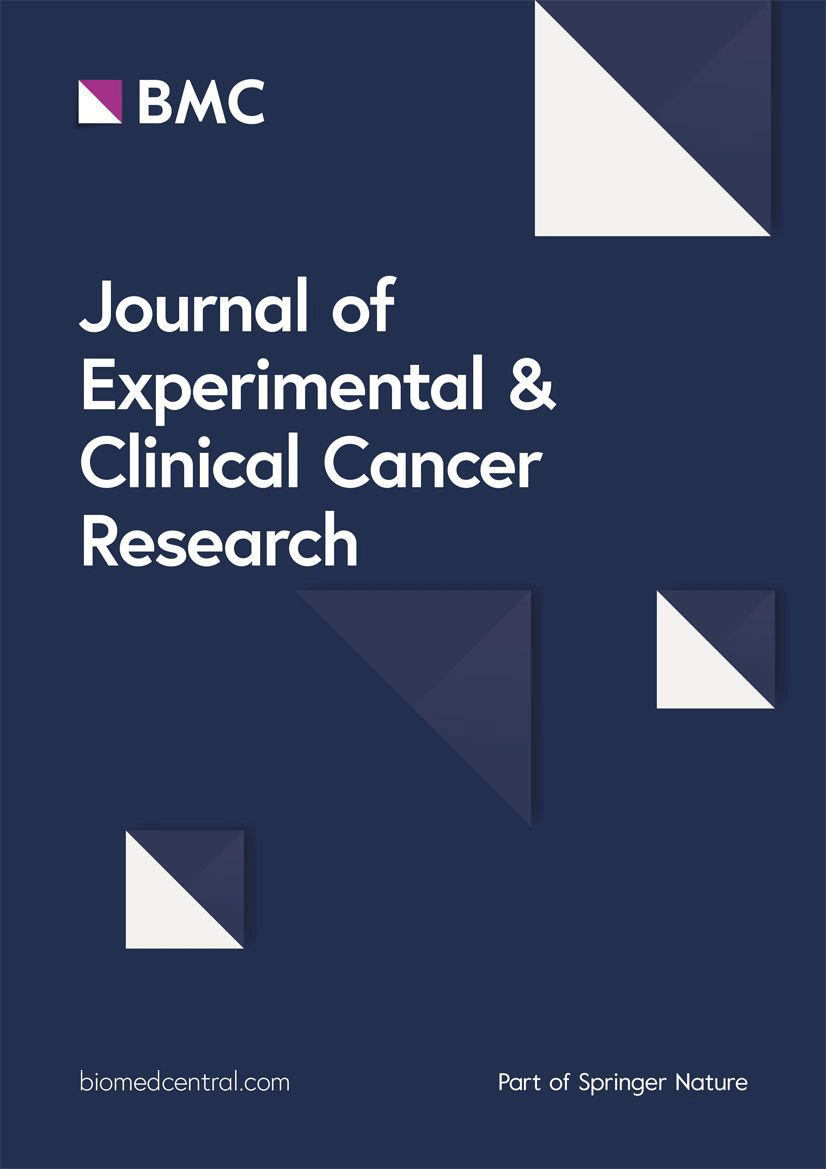Tumor-associated neutrophils upregulate Nectin2 expression, creating the immunosuppressive microenvironment in pancreatic ductal adenocarcinoma
IF 11.4
1区 医学
Q1 ONCOLOGY
Journal of Experimental & Clinical Cancer Research
Pub Date : 2024-09-11
DOI:10.1186/s13046-024-03178-6
引用次数: 0
Abstract
Tumor-associated neutrophils (TANs) constitute an abundant component among tumor-infiltrating immune cells and have recently emerged as a critical player in pancreatic ductal adenocarcinoma (PDAC) progression. This study aimed to elucidate the pro-tumor mechanisms of TAN and identify a novel target for effective immunotherapy against PDAC. Microarray and cytokine array analyses were performed to identify the mechanisms underlying the function of TANs. Human and mouse TANs were obtained from differentiated HL-60 cells and orthotopically transplanted PDAC tumors, respectively. The interactions of TANs with cancer and cytotoxic T-cells were evaluated through in vitro co-culture and in vivo orthotopic or subcutaneous models. Single-cell transcriptomes from patients with PDAC were analyzed to validate the cellular findings. Increased neutrophil infiltration in the tumor microenvironment was associated with poor survival in patients with PDAC. TANs secreted abundant amounts of chemokine ligand 5 (CCL5), subsequently enhancing cancer cell migration and invasion. TANs subpopulations negatively correlated with cytotoxic CD8+ T-cell infiltration in PDAC and promoted T-cell dysfunction. TANs upregulated the membranous expression of Nectin2, which contributed to CD8+ T-cell exhaustion. Blocking Nectin2 improved CD8+ T-cell function and suppressed tumor progression in the mouse model. Single-cell analysis of human PDAC revealed two immunosuppressive TANs phenotypes: Nectin2+ TANs and OLR1+ TANs. Endoplasmic reticulum stress regulated the protumor activities in TANs. TANs enhance PDAC progression by secreting CCL5 and upregulating Nectin2. Targeting the immune checkpoint Nectin2 could represent a novel strategy to enhance immunotherapy efficacy in PDAC.肿瘤相关中性粒细胞上调 Nectin2 的表达,为胰腺导管腺癌创造免疫抑制微环境
肿瘤相关中性粒细胞(TANs)是肿瘤浸润免疫细胞中的一个重要组成部分,最近已成为胰腺导管腺癌(PDAC)进展过程中的一个关键角色。本研究旨在阐明TAN的促瘤机制,并为有效的PDAC免疫疗法找到新的靶点。研究人员进行了微阵列和细胞因子阵列分析,以确定TANs的功能机制。人和小鼠的TAN分别来自分化的HL-60细胞和正位移植的PDAC肿瘤。通过体外共培养和体内正位或皮下模型评估了TANs与癌细胞和细胞毒性T细胞的相互作用。对PDAC患者的单细胞转录组进行了分析,以验证细胞研究结果。肿瘤微环境中中性粒细胞浸润的增加与PDAC患者的生存率低下有关。TANs分泌大量趋化因子配体5(CCL5),从而增强了癌细胞的迁移和侵袭。TANs亚群与PDAC的细胞毒性CD8+ T细胞浸润呈负相关,并促进T细胞功能障碍。TANs上调Nectin2的膜表达,导致CD8+ T细胞衰竭。阻断Nectin2可改善CD8+ T细胞功能,抑制小鼠模型的肿瘤进展。人类 PDAC 的单细胞分析显示了两种免疫抑制 TANs 表型:Nectin2+ TANs和OLR1+ TANs。内质网应激调节TANs的原瘤活性。TANs通过分泌CCL5和上调Nectin2促进PDAC的进展。靶向免疫检查点Nectin2可能是提高PDAC免疫疗法疗效的一种新策略。
本文章由计算机程序翻译,如有差异,请以英文原文为准。
求助全文
约1分钟内获得全文
求助全文
来源期刊
CiteScore
18.20
自引率
1.80%
发文量
333
审稿时长
1 months
期刊介绍:
The Journal of Experimental & Clinical Cancer Research is an esteemed peer-reviewed publication that focuses on cancer research, encompassing everything from fundamental discoveries to practical applications.
We welcome submissions that showcase groundbreaking advancements in the field of cancer research, especially those that bridge the gap between laboratory findings and clinical implementation. Our goal is to foster a deeper understanding of cancer, improve prevention and detection strategies, facilitate accurate diagnosis, and enhance treatment options.
We are particularly interested in manuscripts that shed light on the mechanisms behind the development and progression of cancer, including metastasis. Additionally, we encourage submissions that explore molecular alterations or biomarkers that can help predict the efficacy of different treatments or identify drug resistance. Translational research related to targeted therapies, personalized medicine, tumor immunotherapy, and innovative approaches applicable to clinical investigations are also of great interest to us.
We provide a platform for the dissemination of large-scale molecular characterizations of human tumors and encourage researchers to share their insights, discoveries, and methodologies with the wider scientific community.
By publishing high-quality research articles, reviews, and commentaries, the Journal of Experimental & Clinical Cancer Research strives to contribute to the continuous improvement of cancer care and make a meaningful impact on patients' lives.

 求助内容:
求助内容: 应助结果提醒方式:
应助结果提醒方式:


